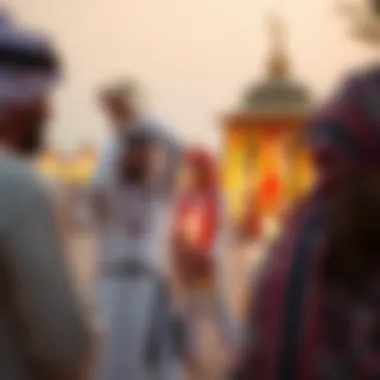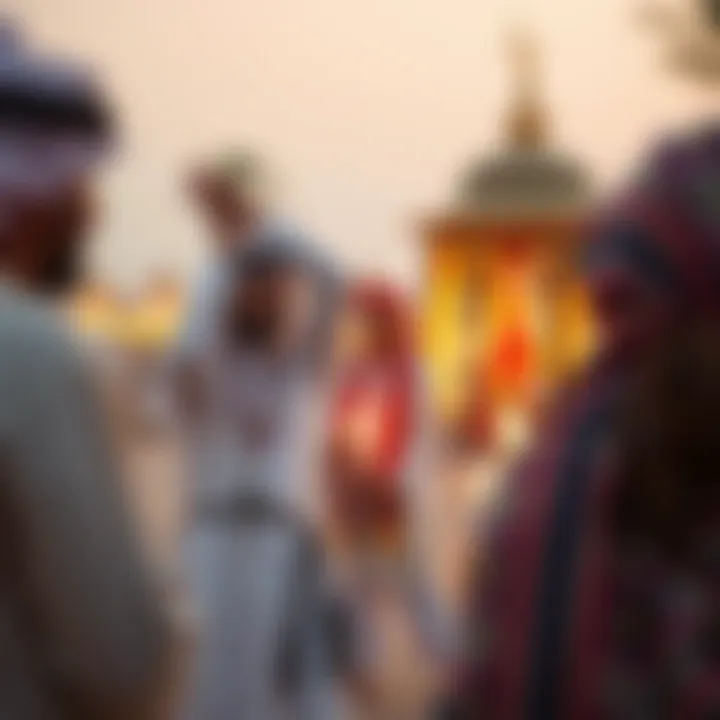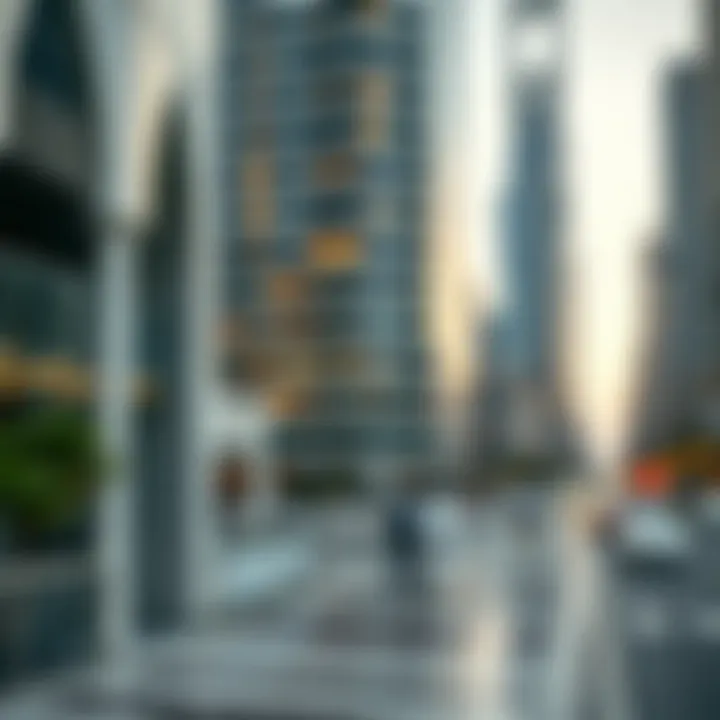Public Holidays in the UAE for 2023: A Comprehensive Guide


Intro
Public holidays in the United Arab Emirates represent more than just time off work. They serve as a vibrant reflection of the country’s rich cultural tapestry and historical milestones. In 2023, these holidays not only offer opportunities for personal and familial gatherings but also present unique challenges and advantages for local businesses and expatriates navigating life in this dynamic region.
Each of the holidays is steeped in tradition and carries significant meaning, shaping how residents and visitors engage with the community. From the solemnity of religious observances to the exuberance of national celebrations, these days highlight the UAE’s blend of modernity and heritage. Understanding the landscape of public holidays helps expats and investors alike to better navigate their personal and professional lives within this thriving nation.
Market Insights
When we speak of public holidays, it’s crucial to consider their impact on various sectors, including the real estate market in the UAE, particularly in places like Dubai. The ebb and flow of people during these holiday seasons can dramatically affect property occupancy rates, rental prices, and sales dynamics.
Current Trends in Dubai Real Estate
In recent years, during the public holidays, there has been a notable surge in short-term rentals, particularly during occasions such as Eid and National Day. Investors have recognized these opportunities, capitalizing on the influx of tourists and residents celebrating the holidays. As the Emirate continues to position itself as a global city, the property market sees variations in demand which aligns closely with these key dates.
Moreover, the high demand often results in increased prices for premium properties, especially in popular tourist spots and affluent neighborhoods. Despite fluctuation, savvy investors know that public holidays can often serve as bellwethers for the overall health of the real estate market.
Future Predictions and Market Analysis
Looking ahead, the upcoming holidays in 2023 may yield insights into future trends. If historical data is anything to judge by, expect to see a continued interest in luxury and high-ROI properties as more expatriates seek unique living experiences during these festive periods. Prospective investors would do well to observe how holiday-related demand impacts various price segments in the market, as this could inform their strategies moving forward.
In summary, public holidays should be viewed not merely as days off but as vital aspects influencing the broader economic landscape in the UAE, particularly within the real estate sector. Understanding these insights can empower both seasoned investors and newcomers to make informed decisions.
Public holidays are more than just markers of time; they are crucial indicators of market behavior and consumer sentiment.
Investors need to pay keen attention to the relationships between holiday dates and market trends, as these can guide better investment choices and strategies in synchronization with local customs and expectations.
Overview of Public Holidays
Public holidays in the United Arab Emirates serve as crucial markers in the social and economic landscape of the nation. They not only provide time off for rest and celebration but also play a pivotal role in shaping community identity. Understanding these holidays allows for a comprehensive view of the UAE's cultural fabric and its evolution over time.
Definition and Importance
Public holidays can be defined as officially designated days on which normal business operations are suspended to observe a celebration or a significant event. In the UAE, these holidays reflect both the Islamic faith and the country's national identity.
The importance of recognizing these dates extends beyond mere observance; they are integral to the local economy and lifestyle, creating opportunities for retail, tourism, and hospitality sectors to flourish. Knowing when these holidays occur helps individuals and businesses plan more effectively, optimizing both social engagements and commercial activities.
Key Benefits of Understanding Public Holidays include:
- Enhanced cultural awareness for expats and visitors.
- Increased economic opportunities for local businesses and investors.
- Improved planning for events and travel for both residents and tourists.
- Fostering a sense of community and belonging around shared celebrations.
Cultural Relevance
Cultural relevance of these holidays cannot be understated. Each holiday carries deep historical and religious significance, rooted in the traditions of the UAE. For instance, periods such as Eid al-Adha and Eid al-Fitr are not just about rituals — they are times of giving and reflection that unify families and communities across the country.
Public holidays also serve as a bridge between traditional values and contemporary lifestyles. They provide a platform for activities that emphasize both cultural heritage and modern societal dynamics. They see a blend of customs from past generations meeting the fast-paced life of today, portraying an intriguing picture of the Emirati experience.
"Understanding the cultural importance of public holidays in the UAE is not only about marking a calendar, but engaging with a rich tapestry of traditions that bind communities together."
Through this lens, holidays allow for a deeper appreciation of what it means to live and work in the UAE, fostering a unique blend of modernity and tradition that is particularly characteristic of this region. This perspective remains invaluable for investors, expats, and anyone seeking to navigate the intricate social dynamics of the Emirates.
New Year’s Day
Date and Celebration
In 2023, New Year’s Day in the UAE falls on January 1st. Celebrating the New Year is significant for many, framing it not just as the beginning of another year but as a reset, a fresh chapter in the life of individuals and communities alike. The holiday presents an opportunity for families and friends to come together, marking the conclusion of the old year with reflections and hopes for the new.
As the clock strikes midnight, many cities across the emirates light up with vibrant fireworks. The spectacle in places like Dubai often captures widespread attention, where visitors gather around iconic landmarks such as the Burj Khalifa to witness dazzling displays illuminating the skyline. Restaurants offer special menus, and many hotels host extravagant gatherings that combine food, music, and entertainment to usher in the new year in style. The celebration includes various performances showcasing local talents, further emphasizing community spirit and cultural richness.
Traditions and Festivities
The traditions surrounding New Year’s Day in the UAE blend modernity with cultural practices, reflecting the nation’s diverse society. Here are a few elements that characterize the festivities:
- Family Gatherings: It’s common for families to come together, share meals, and reminisce about the past year. This is not just a time for celebration but also an occasion for strengthening family ties.
- Special Dishes: Traditional meals often play a role in the celebrations. Many families may prepare dishes that are believed to bring good luck for the coming year, often incorporating rich flavors and spices unique to Emirati cuisine.
- Fireworks and Events: Public displays of fireworks will be seen in main cities. In Dubai, for instance, events are often grandeur, attracting thousands, including tourists. These displays symbolize the joy and exuberance of welcoming the new year.
- International Influences: Given the diverse expatriate community in the UAE, it’s not unusual for various international customs to seep into the local celebration. Many people engage in festive events that highlight cultural traditions from around the world, such as throwing confetti, singing songs, or making resolutions.
"A New Year's celebration in the UAE is where tradition meets global trends, creating a unique tapestry of joy and reflection."
Overall, New Year’s Day in the UAE is more than just a public holiday; it's a rich cultural confluence where collective hopes and aspirations for the future blend seamlessly with festive revelry.
Eid al-Fitr
Significance and Date
Eid al-Fitr is a cornerstone of the Islamic calendar and serves as a significant celebration marking the end of Ramadan, the holy month of fasting. In the UAE, this celebration holds a special place for Muslims and is characterized by a blend of spirituality and communal bonding. It’s a time when families get together, donning their finest garments, reflecting the importance of this cherished occasion.
In 2023, Eid al-Fitr is expected to be celebrated around April 21st, though the exact date may shift due to the lunar calendar. This variability highlights the importance of careful astronomical observation to ascertain the commencement of the new lunar month.


Typical Activities
Eid al-Fitr encompasses a variety of activities, intertwining cultural traditions with communal spirit. The day typically begins with a special congregational prayer, known as "Salat al-Eid," which reminds attendees of the blessings they receive from God. After prayers, it’s common for families to exchange gifts, often including money known as "Eidiyah" for children, symbolizing joy and festive spirit.
Food plays a central role during Eid celebrations. Families gather for lavish feasts that include dishes such as biryani and sweet treats like baklava or maamoul. Visiting relatives and friends afterward is customary, providing an opportunity to reconnect and share joy. Visiting the graves of loved ones is another poignant practice during this time, emphasizing remembrance and gratitude.
Economic Impact
Eid al-Fitr doesn’t just capture the essence of community and spirituality; it also has significant economic implications. As one of the largest holidays in the UAE, it boosts consumer spending considerably as families engage in shopping sprees for new clothes, gifts, and seasonal delicacies. Retailers typically see a sharp rise in sales during this time.
Moreover, the hospitality sector also reaps benefits, with hotels and restaurants often rolling out special Eid menus and packages. This increase in activity supports various sectors, impacting everything from fashion outlets to food suppliers. Businesses that cater to festive rituals can witness their revenues swell, reflecting the holiday's economic vitality. The ripple effect generated by Eid al-Fitr reinforces the interconnection of culture and commerce in the UAE.
"Eid al-Fitr not only marks a spiritual renewal but also serves as an economic catalyst, weaving together the threads of culture and commerce."
Arafat Day
Observance and Importance
Arafat Day, celebrated on the 9th day of the Islamic month of Dhul Hijjah, holds profound spiritual significance for Muslims worldwide. It's not just another day on the calendar; it marks the culmination of the Hajj pilgrimage for millions who gather on the plains of Arafat, near Mecca. For those unable to travel to Saudi Arabia, the act of observance at home is equally cherished. Various rituals are performed on this sacred day, with the most notable being the practice of fasting.
Fasting on Arafat Day is considered highly meritorious. Those who observe it believe they gain forgiveness for past and future sins, presenting an opportunity for spiritual renewal. Given its timing right before Eid al-Adha, it compels a deeper contemplation of sacrifice and devotion within the Muslim community. The prayers that are recited on this day are seen as a means to connect with the Divine, fostering a sense of unity among observers across the globe.
It's noteworthy that while Arafat Day is closely tied with the Hajj pilgrimage, its significance extends beyond just those who physically partake in the pilgrimage rites. Families and friends come together to reflect, pray, and share their aspirations, making it a cherished day even for those miles away from Mecca.
Connection to Hajj
The connection between Arafat Day and the Hajj pilgrimage is essential and foundational, weaving rich traditions into the tapestry of Islam. On this day, pilgrims stand on the plain of Arafat, praying and supplicating from midday until sunset. This ritual of standing—known as Wuquf—is a pivotal element of Hajj and symbolizes the ultimate surrender and devotion to Allah.
Indeed, the culmination of this spiritual journey embodies the essence of Islam: submission to God's will, renunciation of worldly ties, and a plea for forgiveness. As pilgrims congregate in throngs, all clad in white, the sight is a powerful reminder of equality and humility before God. This gathering is also when Prophet Muhammad delivered his Farewell Sermon, emphasizing the equality of all people regardless of their backgrounds.
For those who are observing Arafat Day in their home countries, the bond they share with those in pilgrimage resonates deeply during prayers and communal gatherings. Many participate in reflection sessions, recite Quranic verses, and engage in charity, emphasizing the spirit of giving and community.
Eid al-Adha
Eid al-Adha, often referred to as the "Festival of Sacrifice," holds profound significance in the cultural and religious landscape of the United Arab Emirates. This holiday is not just a day off from work; it embodies deep-rooted traditions, communal unity, and spiritual reflection. Each year, it brings together families and communities alike, reinforcing the importance of compassion and charity within society. For investors, realtors, and expatriates, it offers a window into the local customs and values that shape life in the Emirates.
Overview and Date
In 2023, Eid al-Adha is expected to be observed from June 27 to June 30, depending on the sighting of the moon. This holiday is contingent on the Islamic lunar calendar, making its exact date fluid. The holiday commences with the morning prayer at mosques and prayer grounds, where communities gather. The atmosphere is charged with a sense of anticipation as families don their best attire, often incorporating traditional garments that reflect their heritage.
The observance of Eid al-Adha resonates beyond the prayers; it marks the end of the Hajj pilgrimage, thus intertwining spiritual fulfillment and communal festivity. During this period, vast numbers of sheep, goats, and cows are sacrificed in remembrance of Prophet Ibrahim's willingness to sacrifice his son as an act of devotion to God. This act of sacrifice is crucial and symbolizes obedience, humility, and the importance of generously sharing one's blessings with those in need.
On Eid al-Adha, the spirit of giving transcends materiality, as acts of charity flourish, bringing relief to the less fortunate within the community.
Worship and Reflection
Eid al-Adha invites extensive worship and introspection. Those who can afford it engage in the ritual of Qurbani, performing the ritual sacrifice that is then distributed among family, friends, and the needy. This practice not only fulfills a religious obligation but also reinforces the communal bonds that underpin Emirati society. In a place like the UAE, where expatriates from diverse backgrounds coexist, this occasion fosters intercultural interactions that enrich the experience for all involved.
Moreover, after the prayers, it is customary to engage in festive meals with family and friends, sharing a sumptuous feast that often includes traditional dishes such as mughrabieh or lamb kebabs. Such gatherings serve as an opportunity for reflection, as families recount the year’s events, express gratitude, and outline intentions for future endeavors.
The tranquil yet spirited atmosphere during this holiday often prompts non-Muslims to join in the celebrations, showing respect for the customs of their Emirati neighbors. These actions can create lasting impressions and friendships, as cultural exchange is encouraged and celebrated.
Hijri New Year
The Hijri New Year, also known as the Islamic New Year, carries profound cultural and spiritual significance in the United Arab Emirates, as well as in many other Muslim majority countries. Unlike January 1, which is often greeted with grand celebrations, Hijri New Year marks the start of the month of Muharram, signaling a time for reflection and solemnity. A deeper understanding of this occasion not only enriches one's cultural insights but also helps foreigners and expatriates navigate their interactions in the UAE more effectively.
Historical Context
The historical backdrop of the Hijri New Year is steeped in the Islamic calendar's unique lunar system, which comprises 354 or 355 days. This is shorter than the Gregorian solar calendar by approximately 10-12 days. The Islamic calendar dates back to 622 CE, the year when the Prophet Muhammad migrated from Mecca to Medina, an event known as the Hijra. It was during this period that Muslim communities began to organize their lives around this new calendar.
For many, the Hijri New Year serves as a moment of pause, allowing individuals to reflect on the past year and set intentions for the year ahead. It is a time for families to come together, often invoking prayers and wishes for health and blessings. This practice of reflection is tradition-bound, passed down through generations.
Modern Observances
In contemporary settings, Hijri New Year might not see the same frenzy of festivities as other holidays like Eid, but it is still respected and observed. Many businesses and government offices in the UAE recognize this period as a public holiday, allowing employees time to observe the occasion. Commonly, people start the day with prayers at their local mosques, followed by a family meal.
While some may choose to spend this day in quiet contemplation or at home, others are keen to merge tradition with modern life. Sports events, community outreach, and social gatherings often showcase local culture while aligning with the spirit of the Hijri New Year.
"The moment the moon is sighted, a new cycle begins in the life of a Muslim, reminding us of our faith's foundation and our commitments to our community and heritage."
From an economic standpoint, investors and business operators in the UAE should note that the Hijri New Year does impact operational schedules. Many companies adjust their calendars and workflows around this period to accommodate staff leave. Therefore, understanding this holiday can present valuable insights for more effective planning strategies in the UAE market.
Whether you are an expat considering a move, a realtor looking to form connections, or a developer keen on engaging with the local culture, acknowledging the significance of the Hijri New Year is paramount. It underscores the essence of community, reflection, and continuity in a rapidly modernizing world.


Prophet Muhammad's Birthday
Celebrated on the 12th day of Rabi' al-Awwal in the Islamic calendar, Prophet Muhammad's Birthday, or Mawlid, holds a significant place in the hearts of Muslims around the world and particularly in the UAE. This day serves not just as a time for celebration but also a moment to reflect on the life and teachings of one of history's most pivotal figures. Mawlid allows for the intertwining of historical reverence with modern expressions of faith, capturing the essence of Islam's rich cultural tapestry.
Cultural Significance
The cultural importance of Prophet Muhammad's Birthday in the UAE is profound. It's a period marked by communal gatherings, prayers, and a renewed focus on charitable acts. This day does not merely commemorate the birth of the Prophet; it encapsulates his teachings about compassion, generosity, and unity.
- Fellowship: Families often hold gatherings, where they share meals and stories that illustrate the Prophet's character. These meet-ups serve as a way to strengthen bonds within communities.
- Teachings Highlight: Many educational sessions focus on the Prophet's life, his messages of peace, and his role as a reformer. From mosques to community centers, lectures and seminars are common, emphasizing moral values that the Prophet espoused.
- Symbol of Unity: The collective observance, regardless of the cultural backgrounds of the attendees, brings people together under a shared reverence, promoting intercultural dialogue and understanding.
Common Practices
As the date approaches, various customs and activities highlight the significance of the day:
- Processions: In numerous cities across the UAE, colorful processions wind through the streets, with participants chanting praises and reciting verses from the Quran.
- Charitable Acts: Acts of kindness, such as distributing food to the needy or providing support for local charities, are widely practiced. These gestures reflect the Prophet's teachings and emphasize the importance of community and compassion.
- Decorations: Homes, mosques, and public spaces often adorn decorations bearing phrases like "Peace be upon Him" or symbols that represent Islamic faith. Lights and flowers are used to create a festive environment, signifying joy and celebration.
P.S.: To learn more about the cultural aspects of Mawlid, you might check out Britannica or join discussions on platforms like Reddit.
National Day
National Day holds a special place in the hearts of the citizens and residents of the United Arab Emirates. Celebrated on December 2nd each year, it marks the anniversary of the unification of the seven emirates in 1971. This day is not just a day off work; it is a celebration of the nation's identity, culture, and achievements. The significance of this holiday extends beyond mere festivities; it embodies the spirit of unity and pride among the diverse population residing in the UAE.
Celebration of Unity
The essence of National Day is rooted in the concept of unity among the emirates. It serves as a reminder that despite the individual identities of Abu Dhabi, Dubai, Sharjah, and the others, they come together to form a single, cohesive nation. Communities across the country engage in various activities that underscore this idea of unity. Streets are often adorned with the national colors of the UAE, showcasing flags, lights, and decorations that create an atmosphere of joy and patriotism.
"On this day, every corner of the UAE resonates with a shared sense of belonging."
Families and friends gather to share meals, embrace cultural traditions, and engage in nationwide celebrations. Events like parades and fireworks enhance the festive spirit. For many, National Day is a great time to reflect on the nation’s rich history and to remember how far they have come.
National Day Events
Across the UAE, National Day is marked by a variety of events that highlight culture and creativity. From grand parades in major cities to intimate gatherings in local communities, the activities cater to a wide array of preferences. Some popular events include:
- Parades: Colorful processions featuring traditional dance, music, and performances are held in various locations, allowing people to witness the strength and diversity of Emirati culture.
- Firework Displays: As night falls, the sky is lit up with spectacular fireworks. Cities like Dubai and Abu Dhabi organize breathtaking shows that attract thousands of spectators each year.
- Cultural Exhibitions: Many cultural centers and museums host special exhibits showcasing artifacts, art, and multimedia displays that tell the story of the UAE's journey since its formation. This allows participants to gain a deeper insight into the country’s heritage.
In addition to these events, many local businesses and organizations offer special deals and promotions, fostering community spirit while celebrating the national pride that fuels significant local commerce.
Commemoration Day
Commemoration Day holds a special significance in the UAE. Observed on November 30 each year, this day is dedicated to honoring the memory of the nation’s brave soldiers who lost their lives in service to the country. This day stands as a solemn reminder of the sacrifices made for the peace and stability that the UAE enjoys today. Recognizing the contributions of these individuals fosters a culture of gratitude and respect within the community, serving as a bridge between generations who witness the importance of valor and dedication.
Honoring the Fallen
The essence of Commemoration Day lies in the heartfelt tribute paid to the fallen heroes. Across the nation, various memorials and monuments serve as focal points for reflection. Notably, the Wahat Al Karama memorial in Abu Dhabi plays a vital role in this observance. Families of the soldiers, alongside community members, gather to participate in ceremonies.
- Flag Raising Ceremonies: A prominent feature of the day includes the raising of the UAE flag, symbolizing national pride and unity.
- Moments of Silence: Participants usually hold moments of silence, allowing everyone present to reflect on the sacrifices made for their country.
- Tribute Speeches: Government officials and military leaders deliver speeches that often emphasize the values embodied by these soldiers—courage, loyalty, and commitment.
These collective actions reinforce a sense of belonging and shared responsibility towards one's nation, enabling citizens and residents alike to honor those who made the ultimate sacrifice.
Reflection and Remembrance Activities
Reflection and remembrance activities form the backbone of Commemoration Day, allowing individuals and communities to engage in meaningful acts that pay homage to the fallen. Events throughout the country create a mosaic of remembrance that captures the spirit of the day. Here are some typical activities:
- Candlelight Vigils: Many community organizations coordinate candlelight vigils, providing a space for quiet reflection and emotional expression. Lighting candles represents hope and light in the face of loss.
- Military Parades: A public showing of military strength and unity, these parades showcase the discipline and training of UAE's armed forces. They serve both as a show of respect and a reminder of the nation's commitment to defending its sovereignty.
- Educational Workshops: Schools may conduct special sessions where students learn about the history of the UAE Armed Forces and the significance of the sacrifices made. This proactive approach educates younger generations about the importance of national service and instills values of gratitude and service.
- Cultural Programs: Local artists and performers often participate in cultural showcases that depict stories of bravery and sacrifice through various forms of art. This enriches the narrative surrounding the day, adding depth to how society interprets these sacrifices.
Ultimately, Commemoration Day serves as an opportunity for introspection and collective appreciation, ensuring that the heroic deeds of the fallen are never forgotten. It encourages a sense of unity among diverse communities while reinforcing the foundations of loyalty and patriotism.
Commemoration Day is more than just a day of remembrance; it is a rallying point for national identity and communal respect.
By actively engaging in these activities, citizens and residents of the UAE not only pay tribute to those who have served but also strengthen the fabric of society, making everyone aware that such sacrifices lay the groundwork for the present and future of the nation.
Planning Around Public Holidays
Planning around public holidays in the UAE is essential for anyone who wants to navigate the local social and business environment effectively. With a multitude of cultural significance attached to these dates, anticipating them can offer several advantages. For instance, understanding when holidays like Eid al-Fitr or National Day occur can aid in scheduling important business meetings or even personal appointments, ensuring that one does not run into unforeseen closures or disruptions.
Moreover, adjusting one’s plan to these public holidays can lead to better personal experiences too. Many employees receive time off around these occasions, creating opportunities for extended breaks and family gatherings. Thus, being mindful of these dates can foster better relationships, whether in personal or professional contexts.
Impact on Business Operations
Public holidays can significantly sway business operations across the UAE. For example, during Eid celebrations, many companies slow down or even close entirely for a few days. This impacts everything from customer service availability to project timelines. Companies need to plan for this downtime, possibly by shifting deadlines or communicating early with clients about delays.
Additionally, supply chains may experience hurdles. Businesses reliant on goods and deliveries should account for potential disruptions caused by these holidays. It’s a good practice to ensure that inventory is well-stocked before the holidays kick in, avoiding frantic last-minute orders that could lead to unexpected costs. Companies who anticipate these public holidays tend to position themselves as reliable players in their markets.
"Understanding public holidays is not just about marking dates on a calendar; it’s about crafting a thoughtful approach that aligns with cultural practices and business needs."
Travel Considerations


Traveling around public holidays in the UAE can be a two-edged sword. On one hand, this might be the perfect time for individuals looking to explore the rich culture and festivities that accompany these holidays. Hotels and local attractions may offer special packages during this season, drawing in tourists and locals alike. However, on the flip side, significant travel congestion can occur, especially around major holidays like Eid al-Fitr.
Visitors should be mindful of peak travel times and better yet, plan to book flights and accommodations well in advance to avoid inflated prices or fully booked venues. Furthermore, local transport can be less accessible due to the influx of travelers and the increase in local residents taking time off.
In summary, whether for personal leisure or business commitments, understanding and planning around public holidays in the UAE allows one to navigate the logistical maze more effectively, ensuring a smooth journey through this vibrant and diverse landscape.
Social and Cultural Reflections
In the United Arab Emirates, public holidays are not just days off from work; they are key moments that reflect the social fabric and cultural identities of its people. With a mix of traditions, beliefs, and modernity, these holidays provide a window into the community's values and collective heritage. Understanding the social and cultural reflections associated with these holidays offers insights into the deep-rooted significance they have in everyday life and the evolving landscape of the UAE.
Holidays channel familial bonds, showcase local customs, and promote intercultural dialogue among residents, both Emirati and expatriate. The essence of these dates resonates not merely on a personal level but also in shaping broader national identity and cohesion. From gatherings to public displays of gratitude and remembrance, public holidays in the UAE serve to reinforce social ties while enriching cultural diversity.
Community Gatherings
Community gatherings play an integral role during public holidays in the UAE, uniting people across various backgrounds. These events emerge as platforms not only for celebration but for fostering relationships. During the festive times such as Eid al-Fitr and National Day, streets bustle with festivals, food stalls, and concerts. Families often come together for lavish feasts, sharing traditional dishes that have been enjoyed for generations.
A vital feature of these gatherings is the spirit of giving, prevalent during holidays like Eid, where it's common to see food banks and charity events supporting those in need. This communal act of generosity strengthens ties and emphasizes shared values among individuals in society. There are also unique activities that locals partake in, like organizing prayer gatherings or charity drives, reinforcing the cultural significance of these holidays as a time for unity, empathy, and kindness.
"Public holidays in UAE are a moment for the community to come together, where differences are set aside and many hearts warm collectively in celebration of shared values."
Modern vs. Traditional Observances
As the UAE advances economically and socioculturally, especially with the influence of globalization, a noticeable shift has taken place regarding how holidays are observed. There’s a delicate balance between traditional practices and modern adaptations. In the past, celebrations were heavily centered around family rituals observed in the home, such as preparing special meals or performing religious rites. These practices were intrinsic to maintaining cultural heritage.
However, in the present day, public celebrations have adopted a more vibrant and diverse approach. While traditional values still cherish the essence of holidays, the infusion of modernity means that events often include fireworks, public performances, and international artists, thereby attracting a wider audience.
This blend of old and new is particularly evident during National Day celebrations where parades and concerts highlight UAE’s achievements while also respecting its history. In addition, festivals like Eid have seen transformations with online communities now organizing virtual events to accommodate those who cannot attend in-person due to various constraints.
Ultimately, the juxtaposition of modern and traditional observances offers a rich tapestry of experiences for individuals, ensuring that as society evolves, the cultural roots remain firmly planted in the context of UAE's unique narrative.
Challenges and Adaptations
In recent years, navigating the complexities of public holidays in the UAE has resulted in various challenges and adaptations. Understanding these aspects is crucial for investors, realtors, expats, developers, and property managers who must align their strategies with the local culture and regulations. As these holidays approach, businesses face unique hurdles that require foresight and adaptability.
Effects of Global Events
The repercussions of large-scale global events can significantly affect the celebration of public holidays in the UAE. Consider the effects of the COVID-19 pandemic, which reshaped public gatherings and celebrations. In response to health concerns, people had to adapt by scaling back traditional events or conducting them virtually. As the dust settles, attitudes towards public interaction are slowly returning, but the lessons learned are set to influence future observance.
In addition to health crises, geopolitical shifts and economic impacts worldwide can also ripple through local festivities. For instance, fluctuating oil prices may affect national spending on cultural events, thereby influencing how local holidays are celebrated. Investors and developers keeping a keen eye on these patterns can foresee opportunities or threats ahead.
Moreover, events such as international conferences or significant diplomatic meetings can draw attention away from local holidays. Adjustments in public schedules may become necessary as city administrations balance urban priorities with communal celebrations. Businesses can benefit from being keenly aware of these intersections; planning for tourist influx during major conferences could lead to fruitful profits while ensuring to accommodate for local traditions.
"Understanding how global events impact local holidays provides an edge in investment and business strategies."
Cultural Preservation in a Changing Landscape
Cultural preservation becomes vital in a rapidly evolving landscape where modernization meets tradition. As the UAE continues to expand on a global scale, a trend toward globalization can often overshadow indigenous practices. Despite this, maintaining cultural identity remains paramount.
Festivals like Eid al-Fitr and National Day serve as a reminder of the rich heritage of the UAE. Local governance actively promotes initiatives to ensure these traditions remain prominent. For example, educational programs in schools help engage younger generations in cultural practices, ensuring the next wave continues to respect and uphold these holidays.
However, the introduction of foreign customs poses both challenges and opportunities. By observing how expatriates celebrate their own holidays, local communities can find inspiration to enhance their own traditions. Conversely, maintaining authentic UAE practices in the face of foreign influences can necessitate careful calibration.
Investors focusing on property management and real estate can play a pivotal role in cultural preservation. Through development projects that respect local architecture and social customs, there is potential to create vibrant communities that celebrate both heritage and diversity. This blend fosters a sense of unity among residents, which can be appealing to prospective buyers or renters looking for a culturally rich living environment.
Ultimately, the ability to adapt and embrace changes while respecting traditions can be an asset in harnessing the true spirit of public holidays. By remaining informed and responsive, stakeholders can nurture an environment where both progress and tradition coexist harmoniously.
Epilogue
Firstly, public holidays offer a glimpse into the UAE’s rich cultural tapestry, weaving together centuries of tradition and communal values. Each holiday, from Eid al-Fitr to National Day, presents an opportunity for individuals and communities to engage in shared experiences that foster unity and identity. This cultural connectivity is essential, especially for those planning to establish roots in the UAE.
Additionally, recognizing these holidays positively impacts business operations. Companies that acknowledge and respect local public holidays are better positioned to foster goodwill, strengthen their brand, and create a harmonious workplace. For expats, understanding the work calendar helps in planning vacations and family activities, thereby maximizing their overall experience in the region.
In summary, the public holidays not only represent days of celebration but also reflect deeper values and communal observances. They play a considerable role in shaping the socio-economic landscape, influencing decisions made by those living or working in the UAE.
Recap of Key Holidays
- New Year’s Day: Celebrated with fireworks and gatherings, marking the start of the calendar year.
- Eid al-Fitr: A significant religious holiday that celebrates the end of Ramadan, characterized by prayers and feasting.
- Arafat Day: Honors the culmination of Hajj, a day of reflection and prayer for millions.
- Eid al-Adha: Commemorates the willingness of Ibrahim to sacrifice his son as an act of obedience.
- Hijri New Year: Marks the beginning of the Islamic lunar calendar and paves way for thoughtful remembrance.
- Prophet Muhammad's Birthday: Celebrated with teachings and reflections on the Prophet’s life.
- National Day: A vibrant display of unity and national pride, commemorating the formation of the UAE.
- Commemoration Day: Honoring the sacrifice of those who defended the nation, encouraging collective remembrance.
These holidays serve not just as dates on a calendar but as pillars supporting the cultural and historical framework of the UAE.
Final Thoughts on Cultural Pilgrimage
In essence, the concept of a cultural pilgrimage can be applied to the observance of public holidays in the UAE. Similar to an actual pilgrimage where individuals seek spiritual gratification, celebrating these public holidays promotes cultural understanding and a sense of belonging.
These occasions allow individuals, both local and expatriate, to reflect on their place within the community, enriching their experience in the UAE. By partaking in traditional celebrations and adhering to cultural norms, expats can connect more deeply with their surroundings, fostering a profound appreciation for the lifestyle and ethos of the region.
As cultural dynamics evolve in this region, so too does the significance of these holidays. They remain constant reminders of the values that shape society, and participating in them enhances one's journey in the UAE.
Engaging with public holidays not only enriches life experiences but also assists in building professional networks and friendships, ultimately leading to a more harmonious living environment in this vibrant country.















